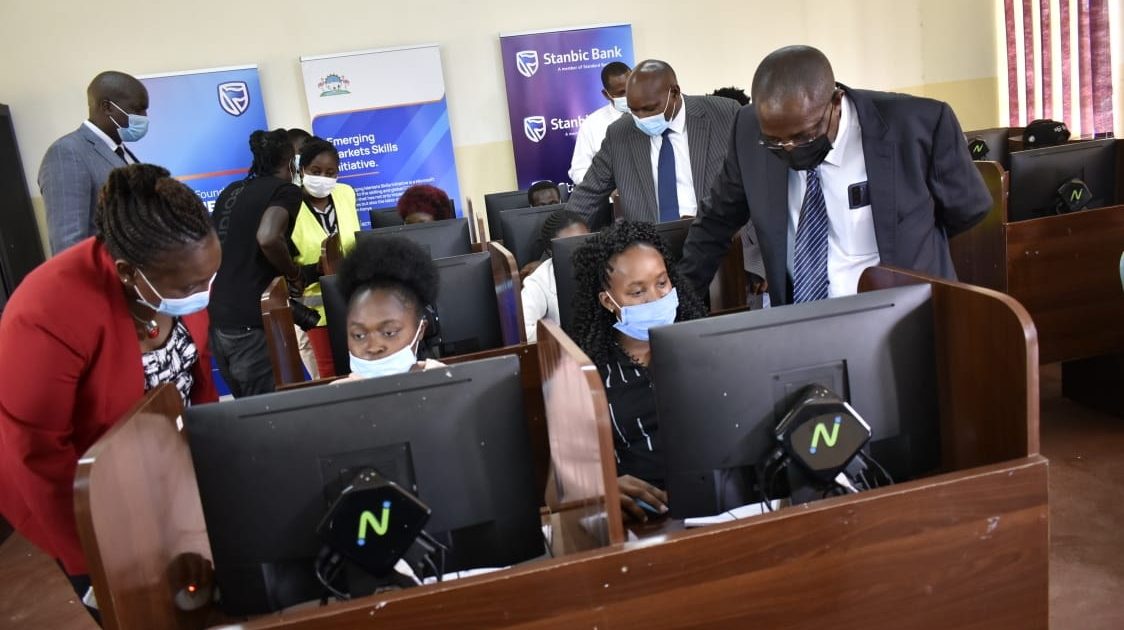Over 1000 youth and women will benefit from a digital literacy programme launched by the County Government of Nakuru in partnership with Stanbic Bank.
County Executive Committee Member for Education, Information Communication Technology and e-Government Mr Francis Mwangi said that the programme would equip the youth and women with skills from the basics of e-commerce to operations, marketing, finance and sales as a way of countering Covid-19 disruption.
Speaking when he launched training for 125 participants at the Rongai Sub-County digital hub, Mwangi indicated that the initial phase of the Digital Commerce Training Program will be limited to five digital hubs spread out in Rongai, Subukia, Kuresoi South, Nakuru East and Nakuru West sub counties.
“For the first phase, we are targeting 500 youth between the ages of 25-35 and 200 women, drawn from all the wards within the five sub-counties. We will in the coming weeks roll out the exercise in Njoro, Molo, Gilgil, Naivasha, Kuresoi North, and Bahati Sub-Counties. The first phase will run up to July 23, 2021,” said the CEC.
Mwangi who was accompanied by Executive Director and head of Stanbic Kenya foundation Ms Pauline Mbayah said the program would benefit the county as it has a high number of unemployed youths.
“The programme has come at the right time. Information, communication and technology (ICT) education will help the county in setting up ICT-enabled enterprises at a time Covid-19 pandemic has rocked businesses,” he said.
He added, “Nakuru is set for smart-city development. And this will be possible through the development of ICT. As a county government, one of our pillars is to embrace technology,”
Mr Mwangi indicated that computer skills gained will enable the youths engage in online classes, develop entrepreneurship skills and earn a living through online jobs and marketing.
He stated that there was a growing need for entrepreneurs to join the digital market to expose Kenyan goods to the global market.
“Now more than ever, we need to be innovative to help cushion businesses from the impact of COVID-19 pandemic. We will commit resources to support the initiative, to train vendors and give them the tools to sell online effectively
Online trading can help to make more goods and services available for consumers, increase market access for MSMEs and SMEs and encourage investments”, said the CEC.
Ms Mbayah called on the dominant small and micro enterprise sector in the country to exploit the increased online purchases for growth.
She indicated that beneficiaries of the program will also be trained on basic computer operation knowledge, how to scale up businesses and proper management of finances using digital platforms.
The Executive Director observed that since the first case of Covid-19 was confirmed in Kenya women have been more hit economically than men.
“Women run 60.7 per cent of unlicensed (mainly micro) and 31.4 per cent of licensed Micro, Small and Medium Enterprises (MSMEs) in the country.
Women and youth in small and medium-sized enterprises need to embrace technology to look for new markets, and communicate with stakeholders and potential clients,” she added.
Ms Mbayah said the pandemic had further brought about many new opportunities which include online and digital jobs that youth and women could do from home.
“Women and youth, particularly young girls should take advantage of these online opportunities and earn a living for themselves.
We should not take Covid-19 pandemic in a negative way but view it as a normal disruption to business. E-commerce is the way to go since using technology will increase business visibility, exposing it to many potential clients,” she stated.
By Anne Mwale and Helen Kivaya





